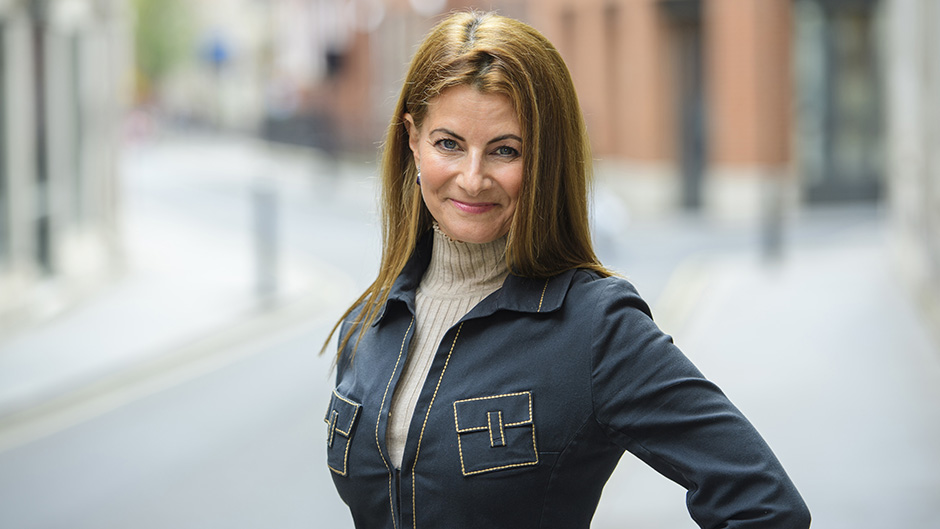Juliana Wheeler has always been, in her words, “a bit of an anglophile.” Her life and career trajectory show that is something of an understatement.
As an undergraduate English major at the University of Miami, she immersed herself in the works of Geoffrey Chaucer, William Shakespeare, the Romantic poets, and 20th century British writers—a centuries-long literary panorama that evokes England’s evolution from insular medieval kingdom to emerging industrial power.
Wheeler’s career as a financial journalist and communications executive brought her to London, where she lived for two decades. What started as a part-time COVID-era consulting job became a full-time role as head of financial communications for the Church of England.
Wheeler develops and delivers marketing and communications strategies for the Church Commissioners for England, which manages the Church’s multi-billion pound sterling endowment, as well as the Church of England Pensions Board and the Ethical Investment Advisory Group.
Most recently, Wheeler was part of a team that managed communications on behalf of the Church for an ancient rite that last took place 70 years ago: the coronation of King Charles III and Queen Camilla.
The ceremony on May 6 was conducted by Justin Welby, the Archbishop of Canterbury and principal leader of the Church of England. Like every English (and later, British) coronation since that of William the Conqueror on Christmas Day 1066, the ceremony took place in Westminster Abbey in central London.
There, before 2,000 invited guests and a worldwide television and online audience, Charles III was crowned with St. Edward’s Crown and invested with the regalia of monarchy. He sat in the 14th-century Coronation Chair, which enclosed the Stone of Destiny, the ancient block of sandstone on which kings of Scotland were inaugurated. Normally kept at Edinburgh Castle, the stone was brought to the Abbey for the occasion, symbolizing the shared history of the nations of the United Kingdom.
At its heart, the coronation is a Christian ceremony, central elements of which include the anointing of the king and his swearing of a solemn oath. According to the commentary included in the authorized coronation liturgy commissioned by Archbishop Welby and published in late April, some parts of the ceremony date to the coronation of King Edgar in 973 CE.
Wheeler shared the enormity of the undertaking to communicate the coronation and the Church’s role, both to the public at large and to the multitude of royal, religious, and London-based international correspondents covering the events.
“Some of this goes back more than a thousand years,” Wheeler said a few weeks before the ceremony. “While [the service] will certainly be up to date, there will be some elements that will be recognizable to those who watched 70 years ago.”
The world is very different from the way it was then, not least with the advent of the Internet and social media. The coronation ceremony has evolved to reflect the ways Britain has changed since Elizabeth II was crowned in 1953, while retaining its immutable religious core.
“Nobody in the Church of England organization had had direct experience of a coronation,” Wheeler said of the task she and her colleagues undertook. “We were a very collaborative team, working with the archbishop, his advisors, and [his office at] Lambeth Palace. Some members of the team are committed Anglicans; some are from the charity sector. I come from a very different, more corporate background, and I am used to working in high pressured environments.
“Diversity in the Church of England is relevant here—Church leaders recognize that different people bring different strengths to the table,” she added.
Among Wheeler’s strengths was, and is, her skill at communicating complex topics and material to non-expert readers. “It helps to be a fast learner, adaptable and resourceful, making sure you know enough [about a subject] to do your job well, and getting into important details without being slowed down,” she said.
She honed these skills at the University of Miami, where she remains engaged as a member of the Alumni Board of Directors.
During her undergraduate years, Wheeler wrote—a lot. “These were very writing-intensive courses,” she recalled. “And I remember spending a lot of time in the Writing Center. I definitely had the bug.”
Wheeler’s graduate studies in the School of Communication, where she earned a master's degree in journalism, broadened her horizons further. An internship working with the Miami bureau of the New York Times meant that she was able to write for international audiences, in Latin America and the Caribbean.
That experience led to a job at Bloomberg News, just as the company was expanding into overseas markets. Even then, Wheeler had no doubt that this was what she wanted to do. “If I ended up in a role where I didn’t have to write every day, that would not be the job for me,” she said.
She joined the Financial Times as a reporter in 2000, and for the next two decades worked in a succession of marketing, media relations, and strategic communications positions in London. In 2020, at the height of the COVID lockdown in Britain, she sought a new role.
Through her professional network, she was tapped to write the Church Commissioners for England Annual Report, leading to her current role. Working on the coronation was an unexpected bonus, one that Wheeler thoroughly enjoyed.
“Even for those who are not royalists, people leave other differences aside to celebrate as a community,” Wheeler said of the festivities that took place throughout the U.K. over the long coronation weekend, which included a bank holiday. “I feel really privileged and honored to play a small role—to be part of this momentous occasion.”

